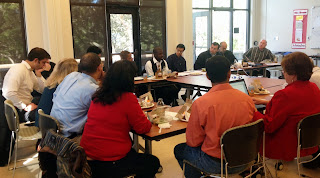Breaking Down the Programming Divide: Democratize Computing Lab
Tue, 5 November, 2013 at 1:48 pm
A group of entrepreneurs gathered on the Cañada campus
in late October with a simple goal in mind: Demystify the world of computer
coding and broaden and diversify the pool of software creators around the
world.
It’s part of global effort that seeks to teach programming skills to designers, artists, women, people of color, scientists, health professionals, humanities majors, entrepreneurs – anyone who desires to add software to their creative problem solving arsenal. Kay O’Neill, Director for Workforce Development at Cañada, invited the Democratize Computing Lab Advisory Board to meet on campus. The quarterly meetings are led by about 30 entrepreneurs, and their respective organizations, including large tech companies such as Google and Facebook.
“Our goal is two-fold,” O’Neill said. “We want to empower people to thrive in today’s increasingly digital society, and to infuse the software development field with creative, big-picture thinkers. We want to open up the possibility for software creation to become part of a universal skill set just as literacy itself moved from a narrow elite to society at large over the course of modern history.”
It’s part of global effort that seeks to teach programming skills to designers, artists, women, people of color, scientists, health professionals, humanities majors, entrepreneurs – anyone who desires to add software to their creative problem solving arsenal. Kay O’Neill, Director for Workforce Development at Cañada, invited the Democratize Computing Lab Advisory Board to meet on campus. The quarterly meetings are led by about 30 entrepreneurs, and their respective organizations, including large tech companies such as Google and Facebook.
“Our goal is two-fold,” O’Neill said. “We want to empower people to thrive in today’s increasingly digital society, and to infuse the software development field with creative, big-picture thinkers. We want to open up the possibility for software creation to become part of a universal skill set just as literacy itself moved from a narrow elite to society at large over the course of modern history.”

